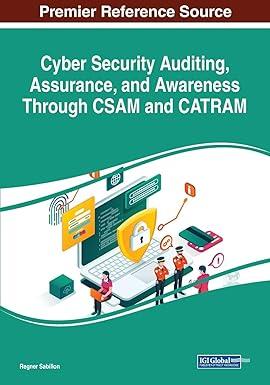Question
CASE STUDY: ESTATE AND INCOME TAX ASSIGNMENT INSTRUCTIONS OVERVIEW This is the first of four case studies that you will be preparing in this course.
CASE STUDY: ESTATE AND INCOME TAX ASSIGNMENT INSTRUCTIONS OVERVIEW This is the first of four case studies that you will be preparing in this course. The purpose of these case study assignments is to give you the opportunity to research and analyze real-world scenarios that you might face as an accountant assisting clients with estate and/or gift tax planning. Each case study focuses on a very narrow scenario, so you will need to look beyond your textbook for proper analysis.
case study scenario
Before her death, Sarah entered into the following transactions:
Sarah borrowed $600,000 from her brother, David, so that she could start a business. The loan was on open account, and no interest or due date was provided for. Under applicable state law, collection on the loan was barred by the statute of limitations before Sarah died. Because the family thought that David should recover his funds, the executor of the estate paid him $600,000.
Sarah borrowed $300,000 from a bank and promptly loaned that sum to her controlled corporation. The executor of Sarahs estate prepaid the bank loan, but never attempted to collect the amount due Sarah from the corporation.
Sarah promised her sister, Ida, a bequest of $500,000 if Ida would move in with her and care for her during an illness (which eventually proved to be terminal). Sarah never kept her promise, as her will was silent on any bequest to Ida. After Sarahs death, Ida sued the estate and eventually recovered $600,000 for breach of contract.
One of the assets in Sarahs estate was a lavish residence that passed to Barry under a specific provision of the will. Barry did not want the residence, preferring cash instead. Per Barrys instructions, the residence was sold. Expenses incurred in connection with the sale were deducted on the Form 706 filed by Sarahs estate.
Before her death, Sarah incurred and paid certain medical expenses but did not have the opportunity to file a claim for recovery from her insurance company. After her death, the claim was filed by Sarahs executor, and the reimbursement was paid to the estate.
Step by Step Solution
There are 3 Steps involved in it
Step: 1

Get Instant Access to Expert-Tailored Solutions
See step-by-step solutions with expert insights and AI powered tools for academic success
Step: 2

Step: 3

Ace Your Homework with AI
Get the answers you need in no time with our AI-driven, step-by-step assistance
Get Started


